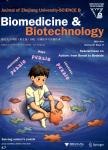Conditional gene manipulation:Cre-ating a new biological era
Conditional gene manipulation:Cre-ating a new biological era作者机构:School of Life ScienceShandong University Jinan 250100China
出 版 物:《Journal of Zhejiang University-Science B(Biomedicine & Biotechnology)》 (浙江大学学报(英文版)B辑(生物医学与生物技术))
年 卷 期:2012年第13卷第7期
页 面:511-524页
核心收录:
学科分类:0710[理学-生物学] 07[理学] 09[农学] 071007[理学-遗传学] 0901[农学-作物学] 090102[农学-作物遗传育种]
基 金:Project supported by the National Natural Science Foundation of China(Nos.30871436,30973297,and 31171194) the National Basic Research Program(973)of China(No.2010CB945002) the Ministry of Education of China(No.200804220011) Shandong Provincial Science and Technology Key Program(No.2009GG10003039),China
主 题:Site-specific recombinase Gene targeting Gene trapping Inducible systems φC31 system
摘 要:To solve the problem of embryonic lethality in conventional gene knockouts, site-specific recombinase (SSR) systems (Cre-loxP, FIp-FRT, and φC31) have been used for tissue-specific gene knockout. With the combination of an SSR system and inducible gene expression systems (tetracycline and tamoxifen), stage-specific knockout and transgenic expression can be achieved. The application of this "SSR+inducible" conditional tool to genomic manipulation can be extended in various ways. Alternatives to conditional gene targeting, such as conditional gene trapping, multipurpose conditional alleles, and conditional gene silencing, have been developed. SSR systems can also be used to construct precise disease models with point mutations and chromosomal abnormalities. With these exciting achievements, we are moving towards a new era in which the whole genome can be manipulated as we wish.



